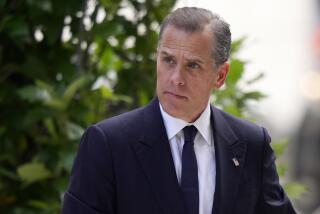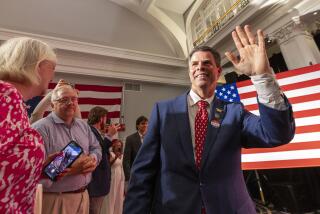A Legal Star Who Burned for Politics
The courtroom was packed and curious lawyers stood in the back. All eyes were on John Edwards, making his closing argument on behalf of a 5-year-old girl horribly injured in a wading pool accident.
For 90 minutes, politely but persistently, Edwards spoke, without notes, without missing a key point. Many here that January day in 1997, including the presiding judge, remember it as the best closing argument they had ever heard.
But what Edwards didn’t tell the jury, and what even the judge didn’t know then, was that the 43-year-old lawyer -- already a legend in the state’s legal fraternity -- was taking an enormous gamble.
Only a few days earlier the defendant, the manufacturer of a plastic drain cover for the pool, had offered to settle the case for $17.5 million -- an amount twice as large as any personal injury verdict in North Carolina history. Yet Edwards had persuaded the girl’s parents to turn it down and take their chances with the jury.
“I couldn’t sleep the night before” that closing argument, Edwards recalled recently. So he lay awake honing his speech.
The jury deliberated for three hours before returning a verdict of $25 million. The verdict, the biggest jury award in Edwards’ 20-year career as a personal injury lawyer, was followed a few months later by a $23-million judgment for the parents of a baby born with brain damage.
But then, abruptly, Edwards gave it all up to enter politics and challenge Republican Sen. Lauch Faircloth, a conservative hog farmer and ally of Sen. Jesse Helms. Edwards spent $6.5 million of his own money -- nearly three-fourths of his total campaign war chest -- and defeated the incumbent, 51% to 47%.
Why did Edwards abandon a lucrative career to run for the Senate? Friends say those last two major cases, coming on the heels of the death of his son in an automobile accident, made Edwards reassess his life’s priorities. He has said the decision grew out of his desire to help people on a larger scale than that offered by a court case. And some say it was equal parts ambition and competitive drive.
“John is very competitive, and he has unlimited self-confidence,” said David Kirby, his law partner and longtime friend. “And he rises to a challenge.”
A Modest Beginning
John Edwards, 50, made a fortune during a career representing injured plaintiffs, winning more than $150 million in judgments from the state’s notoriously tight-fisted juries. But he was born into a family of modest means. His father was a mill worker in Seneca, S.C., and his parents had to borrow $50 from a bank to pay the hospital cost for the birth of their first child, Johnny Reid Edwards.
The family moved to textile-mill towns across the South until settling in Robbins, N.C., where Edwards went to high school. He enrolled in textile studies at North Carolina State University. But what he really wanted to do was become a lawyer, so he went on to the University of North Carolina Law School. While there, he met Elizabeth Anania, the dark-haired daughter of a military family, and they married the summer after graduation.
The couple moved to Nashville, where Edwards worked as a corporate defense lawyer and his wife worked in bankruptcy law. After three years, they returned to North Carolina, and Edwards joined a law practice representing injured plaintiffs, especially children. Joined by Kirby, he would later set up his own firm specializing in personal injury suits.
His first big case came in 1984 when he was asked to represent E.G. Sawyer, a wheelchair-bound man living in a seedy, one-room apartment in Asheville.
A formerly robust salesman, Sawyer had gone to an Asheville hospital to quit drinking. There, a doctor gave him the drug Antabuse, prescribed to help alcoholics dry out, at three times the maximum dosage. Sawyer lapsed into a coma and emerged with brain damage and paralysis.
Edwards sued the hospital on Sawyer’s behalf. In a meeting with the hospital’s lawyers and the judge, he said he would settle the case for $1.5 million, an estimate based on Sawyer’s medical needs.
“That’s ridiculous,” the judge told Edwards, then 31. “You’re just trying to get a notch on your belt, aren’t you?” Asheville jurors are conservative, the judge said, and they are not likely to look fondly on a drunk who sues the hospital. The hospital offered $20,000 to settle the case.
Edwards refused the offer and took the case to trial. He brought in a series of medical experts who testified about the recognized danger of giving high doses of Antabuse.
The doctor who treated Sawyer testified that he had prescribed the higher dose of Antabuse because a nurse had reported Sawyer drinking in the hospital. Edwards found the nurse, and she testified that the doctor had lied -- that she had neither seen him drinking nor made such a report to the doctor.
Late in the trial, Edwards had his client wheeled into the courtroom to testify. The defense lawyer went on the attack. Edwards remembers his opponent’s cross-examination as a lesson in how not to question a sympathetic witness. “Bless his feisty heart, [he] could not resist browbeating the witness in the wheelchair,” Edwards recalled. The lawyer even accused the paralyzed man of having cheated at golf years earlier.
When the jury returned its verdict, Edwards remembered, the judge’s face seemed to go slack. It awarded E.G. Sawyer $3.7 million, then one of the largest personal injury verdicts on record in the state.
That was to be the first of many record verdicts that burnished Edwards’ reputation.
A year later, in 1985, he took on the case of a brain-damaged child in eastern North Carolina. An obstetrician had refused to perform a caesarian section even though the baby was stuck in a breech position. While the fetal monitors showed a weakening heartbeat, neither the nurses nor the doctor took action.
The jurors, most of whom had been born in the same hospital, handed down another record verdict -- $6.5 million -- although the judge reduced it to $4.2 million.
Successful personal injury lawyers, often called trial lawyers, make their living by suing companies on behalf of clients who have been injured by doctors, hospitals or consumer products. They usually take their cases on a contingency basis, receiving 25% to 40% of a judgment if they win and nothing if they lose.
Trial lawyers are applauded by some for representing ordinary Americans wronged by corporate America. But they also are blamed, by President Bush among others, for “frivolous lawsuits” that enrich themselves while driving up the cost of insurance for business and, especially, medical malpractice insurance for doctors and hospitals.
“John likes to paint this rosy picture that he is God’s gift to the downtrodden,” said David P. Sousa, general counsel of Medical Mutual Insurance Co. of North Carolina, which insures 8,000 doctors. “But he made a small fortune suing ordinary people -- ordinary doctors who paid for liability insurance. He has single-handedly put this state in a position where we are losing good doctors. He’s done a tremendous amount of damage.”
Bush traveled to North Carolina last year to castigate “rich trial lawyers” for driving up malpractice insurance costs, citing the last big jury verdict Edwards won, in the case of the brain-damaged baby, as an example of the “litigation lottery.”
Edwards countered with his own news conference, during which he introduced Christopher Griffin, father of the baby, who had died several years after the trial. Griffin said he was angered to be called a “lottery winner.” “Every time I go to my daughter’s grave,” Griffin said, “it’s hard to feel that way.”
Edwards’ pride in his profession is on display everywhere he travels in his presidential bid.
“I’ve been fighting these fights in the courtrooms for 20 years, representing parents and children against the big corporations and the insurance companies,” he said recently in New Hampshire. The nation needs a president who will stand up to “the privileged and the powerful,” not one who is “married to the corporations and their insiders and lobbyists, the big drug companies and the big oil companies. I am so ready for this fight.”
In the Senate, Edwards supported Bush’s decision to go to war with Iraq, but opposed the president’s tax-cut package. He also helped lead the battle for Senate passage of a Patients Bill of Rights, which stalled in the House. Among other things, that bill would have allowed patients to sue their HMOs.
Earning People’s Trust
Edwards has said that a campaign, like a trial, is a drama acted out before ordinary citizens who must make a decision. Neither charm nor bluster will win them over.
“I learned that trials are about credibility -- that if a jury is to believe your case, the jury must believe in you. You have to earn their trust, and after you’ve earned it, you have to earn it again, every day,” Edwards wrote in “Four Trials,” a recently published book on his career.
In North Carolina, even some of his opponents admit that they respect Edwards’ litigation skills.
“He was simply the best trial lawyer I’ve come up against,” said Robert Clay, a well-regarded veteran defense lawyer who lost a big medical malpractice verdict to Edwards. “He was honest and fair on the law. And if you get the jury to like you, they will like your client too.”
By the mid-1990s, Edwards was leading a charmed life. He and his family had moved into a wealthy neighborhood in Raleigh, and they bought a weekend home along the coast. Estimates of his net worth ranged from $20 million to $40 million.
Edwards was a marathon runner, and he and his son Wade climbed 19,340-foot Mt. Kilimanjaro in Tanzania in the summer of 1995.
Wade was among several winners of a national essay contest that earned the Edwards family a trip to Washington and a visit to the White House, including a meeting with First Lady Hillary Rodham Clinton.
But a few weeks after that trip, John and Elizabeth Edwards suffered a shocking blow.
The Edwards family had planned to spend a spring weekend at their beach house. Wade and a friend set out to drive there in the afternoon. Edwards, his wife and daughter Cate were to follow a few hours later. But a gusty storm buffeted the coast, and the Jeep Grand Cherokee was blown off the highway and flipped over. Wade, then 16, died instantly.
Edwards quit work and stayed home for six months to grieve with his wife and daughter. Though Edwards had sued on behalf of families suffering devastating accidents, he didn’t consider suing over Wade’s death. “This was a freakish accident caused by bad weather,” said Kirby, his law partner. “Their goal was to live through it and cope.”
When Edwards returned to work that fall, he found a case that he could throw himself into. It was the case of 5-year-old Valerie Lakey.
Valerie’s accident happened early on a June evening in 1993 at a public pool in Raleigh. Her father, David, was nearby when Valerie and a playmate went to the wading pool while the lifeguards cleared the main pool.
The plastic drain cover in the wading pool was easily popped off, and the two children put their hands over the drain. Valerie sat on it, and she was soon stuck. Her father, frantic, could not pry her loose. When the pump was finally shut off, she had lost about 80% of her intestines.
Valerie’s life was saved by skilled doctors, but she faced a difficult future. She was hooked up to feeding tubes 12 hours a day. After several weeks, her parents, David and Sandy, decided they would need to sue in hopes of winning enough to pay for her medical care, which at the time included the prospect of a kidney or liver transplant. The pool, the county and the pump company agreed to settle for the maximum their insurance policies would pay, nearly $5 million.
However, Sta-Rite Industries, the Wisconsin-based maker of the plastic drain cover, refused to settle. Its lawyers argued that the cover had been improperly installed because it was supposed to be secured with screws through two holes. That was the fault of the pool operators, not the manufacturer, they contended.
The case went to trial and, over seven weeks, Edwards carefully presented his case.
A key moment in the trial came when the company admitted, belatedly, that it had documents in its files of similar cases of people trapped by its drains. And, to the jury, the company didn’t seem in much of a hurry to provide those documents. When the judge asked when the documents would arrive, a defense lawyer replied: “They’re on a truck from Wisconsin.”
Edwards and Kirby used those documents to show that the company had been sued for a series of accidents. Suddenly, Sta-Rite’s lawyers decided they’d better settle the case before it went to the jury.
Edwards called the girl’s parents with the company’s $17.5-million offer. When he suggested that they turn it down, he recalled recently, “there was dead silence on the other end of the line.” But, eventually, they agreed.
At his closing argument, Edwards placed the white plastic drain cover on the railing in front of the jury. Had the maker of that cover simply attached two screws to it, the cover would not have popped off, Edwards said. The company had testified that neither a warning label nor the attached screws were needed, Edwards continued, even though they knew that other children had been trapped in the suction of similar uncovered drains.
“You have been watching what happens when absolute corporate indifference collides with absolute innocence,” Edwards said. “This piece of plastic is the only thing that stands between the children and this hidden, deadly hazard.
“Knowing what you now know, would you have put a warning on the cover?” he asked the jury. “Would you have put those screws in the cover?”
Judge Robert L. Farmer, who presided over the case, remembers well that closing argument.
“He spoke for an hour and a half. He had no notes. He hit every point. You really have to know your case to do that,” said Farmer, who is retired. “He was probably the best I saw in 21 years on the bench.”
So good that Farmer and his wife traveled to Iowa this week to volunteer in the Edwards campaign.
*
(BEGIN TEXT OF INFOBOX)
John Edwards
Personal
Born: June 10, 1953, in Seneca, S.C.
Hometown: Raleigh, N.C.
Family: Married to Elizabeth Edwards. Three children, Cate, a senior at Princeton; Emma Claire, 5; and Jack, 3. Son Wade, 16, died in 1996
Education: North Carolina State University, bachelor of science, 1974. University of North Carolina at Chapel Hill, law degree, 1977
Career: Attorney, 1977-98. U.S. Senate, 1998-present
By the numbers
3 -- Number of marathons Edwards has completed
2000 -- Year he was named sexiest politician in People magazine’s “Sexiest Man Alive” issue
$20 million to $40 million -- Estimates of Edwards’ personal fortune amassed as a trial lawyer
$8.3 million -- Amount Edwards spent in his 1998 Senate campaign against incumbent Republican Lauch Faircloth
75% -- Amount of the $8.3 million that was Edwards’ own money
51% -- Percent of the vote won by Edwards in his Senate bid, against Faircloth’s 47%
$5 million -- Amount for which Edwards sold his North Carolina law practice in 2002
$500 -- Price of one concert ticket and backstage pass to Hootie and the Blowfish’s fundraising concert Jan. 30 for Edwards in Columbia, S.C.
1,926 -- Amazon.com sales rank of Edwards’ 2003 autobiographical courtroom book, “Four Trials”
A closer look
* Edwards, the son of a textile-mill worker father and a shopkeeper and postal employee mother, was the first in his family to attend college.
* The freshman senator oversaw the depositions of key witnesses, including Monica S. Lewinsky and Vernon E. Jordan Jr., in President Clinton’s 1999 impeachment trial, dramatically raising his political profile. This in part led to the one-term junior senator being tapped as Al Gore’s unlikely second choice for a running mate during his 2000 presidential bid.
* Edwards and his wife, Elizabeth, established a scholarship at the University of North Carolina in honor of Elizabeth’s father, a former lacrosse player and coach at the university, and built a computer lab in Raleigh in memory of their son Wade.
The lowdown
Edwards surprised pundits when he out-raised opponents in the first quarter of 2003, thanks to support from trial lawyers. Since then, his fundraising has fallen off and Edwards has settled far back in the pack. Lately, however, he has outshone opponents in debates and drawn bigger crowds. A surprise finish in Iowa could help in New Hampshire and South Carolina, where Edwards faces a must-win test Feb. 3. His avoidance of negative campaigning has won favor with voters. But many question whether the senator has the experience for the White House.
Sources: The Almanac of American Politics, www.johnedwards2004.com, Amazon.com, Christian Science Monitor
-- Analysis by Times staff writer Mark Z. Barabak
More to Read
Sign up for Essential California
The most important California stories and recommendations in your inbox every morning.
You may occasionally receive promotional content from the Los Angeles Times.











